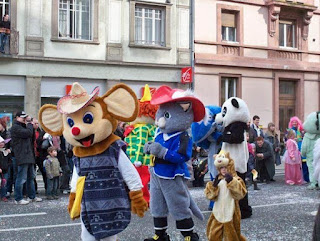Have you noticed the new gadget at the side? French word of the day. Each day the word changes. You can click on the sound image to hear the pronunciation. Click on the back arrow to hear previous words of the day. Cool huh?
Last lesson, we listened to each other's presentations. They were fabulous and you had all worked really hard on them. Thank you. As you lead such interesting lives, we learnt all sorts of random information along the way. In this post, I will 'mop up' the vocabulary which cropped up in your presentations.
Last lesson, we listened to each other's presentations. They were fabulous and you had all worked really hard on them. Thank you. As you lead such interesting lives, we learnt all sorts of random information along the way. In this post, I will 'mop up' the vocabulary which cropped up in your presentations.
sauf = except
les poils = animal hair /fur
faire la queue = to queue
le stage = (work) placement
faire la queue
(not something the French are noted for!)
un avertissement = warning
le feu = fire
empêcher = to prevent
comment empêcher le feu = how to prevent fire
épuise = exhausted
un avertissement
apprendre = to learn (regular RE verb) related to the English word 'apprentice'
enseigner = to teach (regular ER verb)
la leçon} = lesson
le cours}
la peinture = painting
le / la peintre = painter
la peinture
le peintre (and also une peinture)
voler = to fly (regular ER verb)
en vol = in flight
le cygne = swan
faire de l'aviron = to row
un embouteillage = traffic jam
les médicaments = medicine
déménager = to move house
les cygnes en vol
You can say, j'ai vu les cygnes en vol or j'ai vu les cygnes voler
faire de l'aviron
un embouteillage
(think of 'bottleneck')
les médicaments























.JPG)

.jpg)




